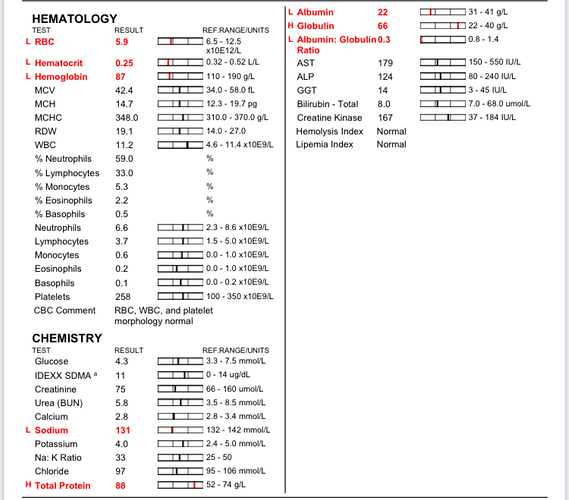I’ll be honest, purchasing a horse for the first time as an AA literally weeks before the pandemic has been an absolute nightmare. I feel like I’m a black pit of bad luck, and my poor horse is at the mercy of whatever mirror I broke or crack I stepped on or ladder I went under or misdeeds I did in a past life.
I feel like my vet isn’t being too helpful, despite being a large clinic it doesn’t sound like they have much experience with further diagnosing this kind of issue? The echocardiogram vet said she had treated 1 other horse with similar blood work results. I don’t know, maybe I’m being picky? But I feel like there are a lot of unknowns in this equation and it’s stressing me out.
Anyway, my gelding has had on and off swollen legs the last two months so I called the vet in. Vet found a heart murmur & ran blood work. Blood work came back bad, high globulin low albumin + low RBC. I’ll see if I can post a picture of the results below. We did an echocardiogram for the heart murmur, heart looked good besides the murmur, major organs looked good as well (liver, lungs & I believe intestines). Breathing & lung capacity was good, no obvious issues there. Vets next step is to test blood again and either do antibiotics (which they’d prefer not to do…) or more invasive testing at the hospital (sampling fluids & tissue + x-ray?/better imaging).
Horse in question is 6 yrs old & in good health. Chronic issues pre-this happening have been allergies (has gotten hives twice before), loose/watery stool, brittle mane & tail (coat is health), and of course he locks his stifles. He has not had dramatic weight loss and no change in energy level/behaviour. Temp has been normal, although unfortunately I didn’t get a temp during the swollen legs episode.
Any guidance/information/anecdotes/paths I should pursue with further diagnosing (or not) would be greatly appreciated 
From my research I’m thinking that an SPEP test will give us a direction to go in at least, am I off base here with this? Also thinking there has to be something we can do to narrow down our options here. The vet made it sound like we’d be throwing darts at any and every possible cause? I’m not very confident in what to do next exactly.
This all feels very very bad & like it won’t end well, am I over reacting here?
ETA; also what can I be doing to keep him comfortable? I’ve been keeping him in work because of the stifle & thinking I should probably feed electrolytes to help him retain fluids? What else should I be doing?

